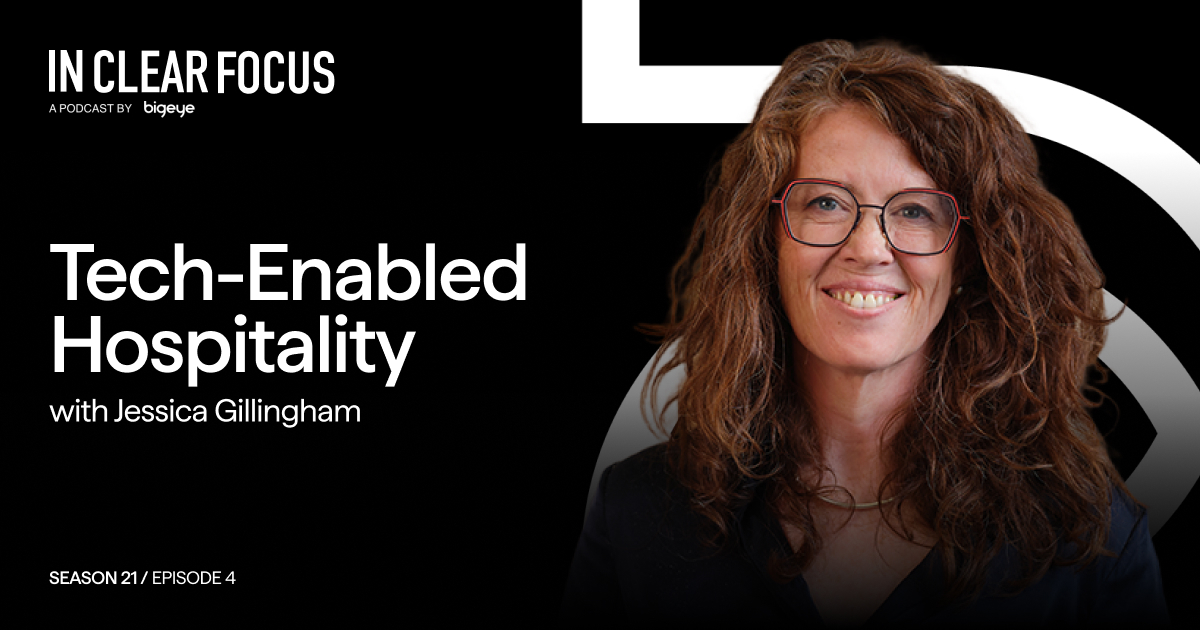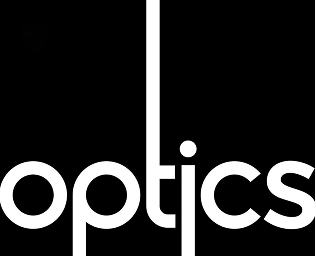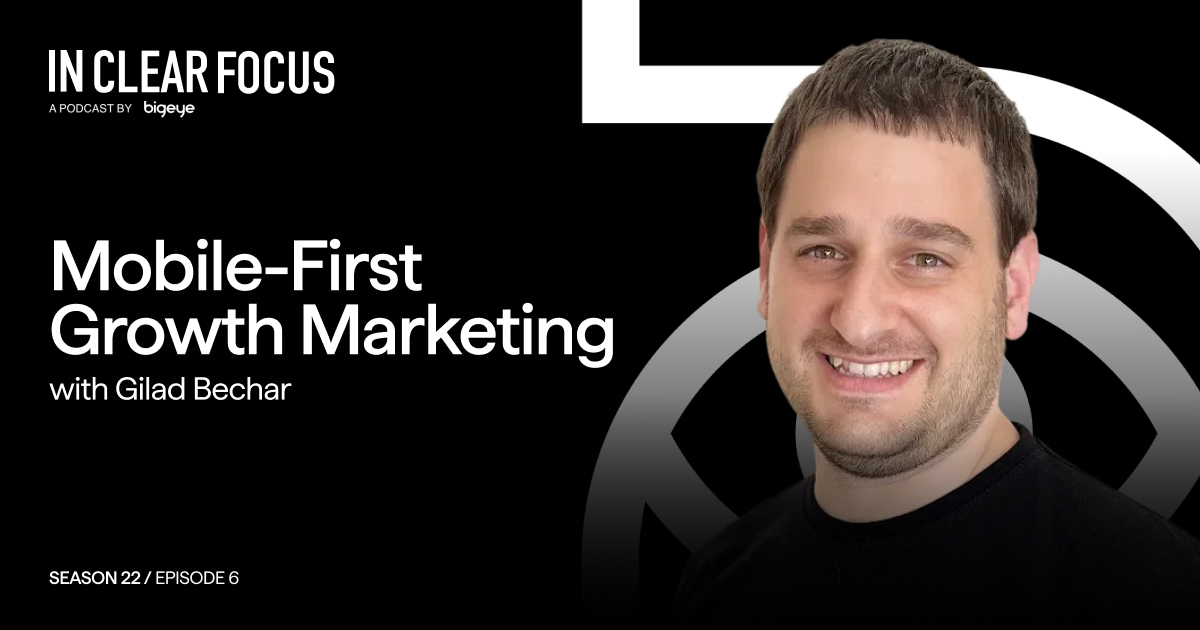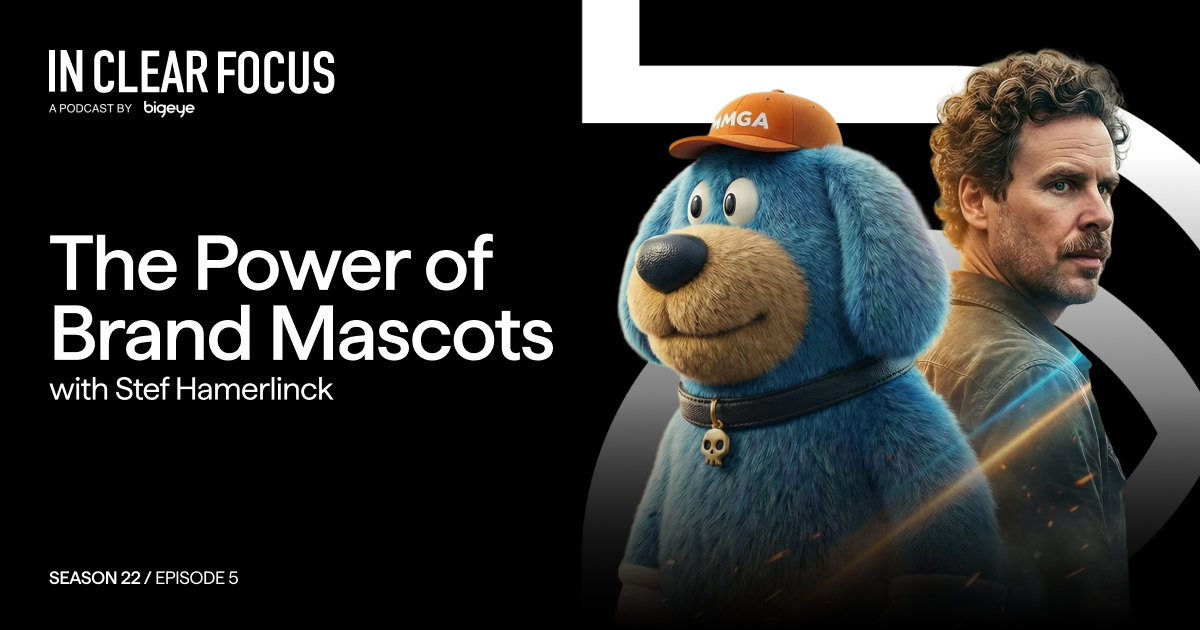IN CLEAR FOCUS: Jessica Gillingham, author of “Tech-Enabled Hospitality,” explores how tech is reshaping hospitality marketing and the guest journey. She discusses the challenge of marketing to digital natives who expect a seamless journey from search to booking. Jessica explains how data silos and reliance on OTAs prevent true personalization and building direct guest relationships. Learn how marketers can create loyalty beyond points and shift from per-night transactions to customer LTV.
Episode Transcript
Adrian Tennant: Coming up in this episode of IN CLEAR FOCUS
Jessica Gillingham: Good guest experience is an experience that works in the way that you want it to work. And it shouldn’t be clunky or disparate or finding information in different locations. And currently in the hotel sector, it actually is rare for it to be fully seamless.
Adrian Tennant: You’re listening to IN CLEAR FOCUS, fresh perspectives on marketing and advertising produced weekly by Bigeye, a strategy-led, full-service creative agency growing brands for clients globally. Hello, I’m your host, Adrian Tennant, Bigeye’s Chief Strategy Officer. Thank you for joining us. The hospitality industry stands at a critical inflection point. Technology is no longer just a back-office tool, it’s becoming central to guest experience and operational success. Yet many hospitality operators struggle to embrace innovation without losing the personal touch that defines exceptional service. Today’s hospitality brands must navigate an increasingly complex technology landscape while maintaining the human connections that create loyal customers. Our guest today brings a unique perspective to these challenges. Jessica Gillingham is the founder and CEO of Abode Worldwide, a global public relations agency specializing in hospitality and property technology companies. With over 20 years of experience in travel, hospitality, and technology sectors, Jessica has established herself as one of the most respected voices at the intersection of technology and hospitality. She’s been recognized as an outstanding independent practitioner by the Chartered Institute of Public Relations and serves as an advisor for multiple industry summits. Jessica is also the co-host of the Pillow Talk Sessions podcast and a regular speaker at industry events, including Skift and the Independent Hotel Show. Jessica’s new book, published by Kogan Page, is “Tech-Enabled Hospitality: Strategies to Elevate Guest Experience and Operational Efficiency.” Drawing on exclusive interviews with 38 senior leaders across 13 countries, the book provides a comprehensive strategic guide for hospitality professionals seeking to integrate technology effectively while preserving the human elements that define exceptional service. To discuss how hospitality brands can leverage technology, the evolving expectations of digital native travelers, and the future of personalization in hospitality marketing, I’m delighted that Jessica is joining us today from Bath in the UK. Jessica, welcome to IN CLEAR FOCUS!
Jessica Gillingham: Adrian, thank you so much for having me. I’m really looking forward to talking to you today.
Adrian Tennant: Jessica, what inspired you to write “Tech-Enabled Hospitality”?
Jessica Gillingham: Firstly, I come from a background of hotel and short-term rental technology, so I run and own a public relations agency called Abode Worldwide, and we work with tech companies in the space. I also speak and write about technology and how it’s impacting hospitality, you know, before the book I was writing and speaking at industry conferences because it’s an area that’s always interested me. But I was actually approached by Kogan Page when they started to develop their hospitality books, and they asked me if there was a particular topic that I felt that was missing from hospitality books. And I thought about it for a little bit. And what really made sense to me was this whole topic of tech-enabled hospitality, which is really where hospitality is going. Now, if you think about hotel stays, they’re an analog experience, basically, you know, we’re not doing those virtually. But everything around them, from the operation side to the guest experience when they’re not necessarily within the property, it can be within it, but also before and after, is nowadays becoming very tech-enabled, which by that I mean technology is the foundation of how hoteliers are connecting with guests when it’s not within the property. And there’s often a sort of almost a wish to disassociate or a bit of a negative connotation of that word ‘tech-enabled’ hospitality. A lot of hoteliers think that technology can’t mean hospitality, and I wanted to co-opt that and bring it back into actual hospitality that uses technology to change the way it’s delivered and experienced is actually absolutely hospitality and is absolutely the future of hospitality. So that’s where the kind of the foundations of the book came from.
Adrian Tennant: Well building on that, in your book, you challenge what you call the ‘technology versus hospitality’ narrative. Can you just explain what you mean by that?
Jessica Gillingham: Yeah, absolutely. So going a little bit deeper on what I was saying around that, there is a sort of a feeling and also quite a vocal community that feels that or says that hospitality and technology cannot happen at the same time. You can’t provide good hospitality, which at the end of the day is about making a guest feel good, feel like their needs are being met, feel like they’re being given a service, and it might mean they’re being provided a home away from home, like it’s an experience. So there’s a feeling that if you put technology between that experience and the guests, then it takes away from the hospitality. But my findings from the book and also my own experience, and all of the research that I did around the book is actually that technology can enhance the hospitality. It doesn’t detract from it. They’re not mutually exclusive concepts, technology and hospitality. So that’s what I meant by that, was really exploring how technology doesn’t detract from the concept of hospitality. It can actually make it even better in some cases.
Adrian Tennant: Well, let’s talk about guest expectations. How are younger travellers like Gen Z changing what hospitality brands need to deliver?
Jessica Gillingham: So, it’s not even just younger brands because I think even you and I, Adrian, we’re using our phones for most things. Not to say you and I aren’t young but, you know, we’re not Gen Z, that’s for sure.
Adrian Tennant: That’s for sure.
Jessica Gillingham: So, you know, even for us, you know, we’re really used to doing so much on our phones, checking into flights, booking train travel, doing our banking, buying our products on Amazon, like a lot of our lives are on our phones, are digital. Whereas the hotel and the hospitality sector is still not there yet in terms of being a really good digital journey. So we obviously have the analog experience when you get there, but often the journey from search to booking can be extremely clunky. You’ve got to go to lots of different places to find information. If you’ve booked through an OTA (online travel agent), they will have your information, but the actual hotel won’t necessarily have had your preferences or even your email address. Like it’s very disparate and clunky. And then also with younger travelers, they’re really interested in things like other user content, like seeing what it feels like to actually be within that property in the channels that they listen to and watch, whether that is TikTok or other kinds of apps, different channels as well. But I think the main thing is that good guest experience is an experience that works in the way that you want it to work. and it shouldn’t be clunky or disparate or finding information in different locations. It needs to be really seamless. And currently in the hotel sector, it actually is rare for it to be fully seamless from the beginning of search, to booking, to check in, to stay, to check out, to post stay as well.
Adrian Tennant: In contrast to CPG categories, for example, one theme in your book is that hospitality hasn’t been very good at really knowing its customer. From a marketing perspective, why is that such a critical gap and how is technology helping to close it?
Jessica Gillingham: So it’s a really interesting question, and it goes on to the point that I had before, which is that the ability to connect with the guests is quite fragmented. So if you’re booking through an OTA, the OTA has your information, but the actual hotelier doesn’t, doesn’t have all of that. So they don’t have your preferences either. So you might have a relationship with Airbnb or you might have a relationship with booking.com or Expedia, but you don’t have that direct relationship with the hotelier. So that’s one part of it. The other part is that data is also siloed. So even if once you get to a property and they get to know you, you’re checked in and all of that, they’ve got your email address, they’ve got your booking history, that information can be quite siloed across different tech stacks within the hotel. So whether it’s the property management software or the food and beverage part, the customer relationship management, as yet, it’s not all in one place. So there’s not a kind of a smooth way of knowing that “Adrian has stayed with us five times before and he likes to have fluffy pillows and he wants to have a window that opens and he likes to eat dinner in our restaurant as soon as he gets here.” So the next time you check in, all that information is there that you don’t have to say again, you know, the kinds of things that you want. So the other part is that the hospitality industry still typically sees guest stays as nights, not as the lifetime value of a customer. So they see it as a transactional, this booking is for three nights, not “Adrian is booking with us and may come back again in three months time or may stay at a sister property in another location.” So that’s some of the reasons why.
Adrian Tennant: Jessica, you write extensively about personalization in hospitality marketing. I think you’ve given us some great examples already, but in your view, what does true personalization look like in practice?
Jessica Gillingham: I think it’s about having a relationship with the customer. So it is about having that one-to-one relationship so that you know them, you anticipate what they want, you understand what might be important to them, and you’re able to be there when they want you to be there. And that can be during the stay, of course. having all those needs met. And that will vary whether it’s a luxury property or whether it’s, you know, a more service only, you know, select service property to all of the kind of the bits you might do before you even get there. So it’s really understanding who your customers are and building a relationship with them. And it’s starting to see it as customer lifetime value, not that revenue per night, not just the transactional thing. So personalization really gives us the ability and technology gives us the ability to provide as many kinds of service if you like, no matter what the stay is that you might get in a luxury hotel in terms of the concierge knows your name they book you the restaurant that you know you want. Whereas you can actually do that through digital means, now you can do it through guest apps you can do it through guest communication tools, you can do it through apps, hotel apps, like it doesn’t need to be just the domain of luxury hotels or on-site. Another point in the book is that we talk also not just about the guest experience side, but the operational side, that there are more and more operators that are building properties that have no staff in them whatsoever, but they’re using digital means to build that relationship and do that personalization piece with their customers.
Adrian Tennant: Your book is titled “Tech-Enabled Hospitality.” In your research, you found that successful operators don’t start with technology, they start with understanding guest needs. Can you walk us through that approach?
Jessica Gillingham: Yes. And this was probably the biggest surprise I had in researching the book. And I spoke to leaders across technology, so leaders that have built tech companies to leaders that are operators. So the folks that I spoke to were pretty technical. And I was expecting them to talk about the tech and really go down, you know, deep roots there. Every single leader that I spoke to, and I spoke to over 38, talked about how hospitality and the guest was at the center of everything, which surprised me because, of course, I knew that the customer was going to be important. But the fact that even the deepest tech minds really thought very deeply about what the guest needs as well as what maybe the operator might need in terms of efficiencies and that kind of thing. So it’s very much about putting the guest – which in essence is what hospitality is – it’s about putting the guests at the front and center of the relationship and their needs there. The other sort of part of that that really came out is that technology is a cultural and a strategic decision. It’s not about tools and tactics. It’s about really embedding it within an organization right from the top down to the bottom up, rather than seeing technology as tools and tactics to fit a solution, it’s about actually embedding it strategically. And if you’re going to do that, you also need to embed experience strategically as well.
Adrian Tennant: You mentioned the importance of lifetime value. So, let’s discuss loyalty programs. Jessica, how is technology reshaping the way hospitality brands build and maintain guest loyalty?
Jessica Gillingham: So there’s still a huge opportunity here to get loyalty right, because the hotel and hospitality sectors don’t really do it terribly well. Like we have point systems with large hotels and loyalty systems, which is … it’s fine, it’s around discounts or upgrades or whatever, but again, it’s not really figuring out what a guest actually would like and what matters to them. It’s not relational, it’s not making them feel part of, it’s just a very, again, transactional approach to building loyalty and building relationships. So I think there’s a huge opportunity for the sector to do a bit more on loyalty programs. But what I have seen, and an example of one that is doing something quite differently, is the Ennismore Group, which is about 14 hotel brands, including The Hoxton. And it’s a global operator. And they have a loyalty program called Disloyalty. And it’s actually a membership program. So you pay a fee. to be part of it. And instead of trying to keep you going back to the hotel that you stayed at, they really incentivize you to go and stay at any and all of the 14 different brands that are within the group, as well as restaurants. There’s restaurants within there as well. And so their sort of thing is, it’s not loyalty to a particular brand or a particular hotel. It’s like, go and stay at any and all of these things. and we’ll look after you. So it’s another way of doing it and keeping people within a community and a membership program so you feel part of something. But I believe that the industry has a huge potential to do loyalty better and that personalization piece, as technology and AI continues to evolve and improve, will be part of that, being able to really grab your guests and keep them.
Adrian Tennant: Let’s take a short break. We’ll be right back after this message.
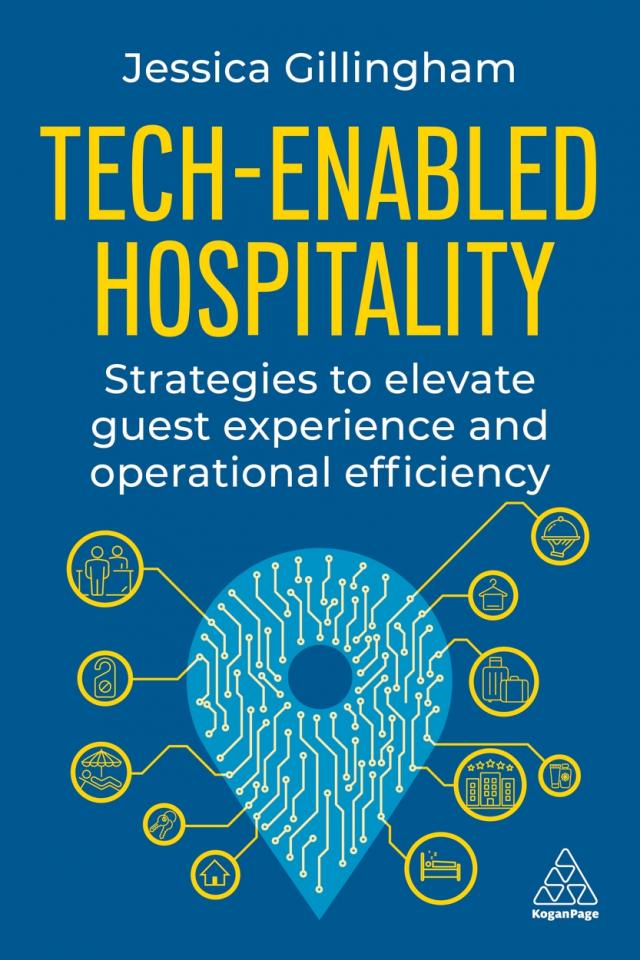 |
Jessica Gillingham: Hello, I’m Jessica Gillingham, author of Tech-Enabled Hospitality: Strategies to Elevate Guest Experience and Operational Efficiency, published by Kogan Page.
I’ve drawn on interviews with 38 senior leaders across 13 countries and insights from brands like Stripe, SiteMinder, Rocco Forte, Hostaway, and Islands Hotel. My book provides marketers with a strategic framework for understanding how technology is transforming guest expectations and behavior. Whether you’re marketing hospitality brands, destinations, or related services, you’ll discover how personalization, AI-driven insights, and digital guest journeys are reshaping the landscape — and learn how to craft marketing strategies that balance innovation with authentic human connections that drive loyalty and lifetime value. As an IN CLEAR FOCUS listener, you can save 25% on Tech-Enabled Hospitality when you order directly from KoganPage.com. Just enter the exclusive promo code BIGEYE25 at checkout. Shipping is always complimentary for customers in the US and the UK. I hope my book helps you develop marketing strategies that resonate with today’s tech-savvy travelers. Thank you! |
Adrian Tennant: Welcome back. I’m talking with Jessica Gillingham, founder and CEO of Abode Worldwide, and the author of the Bigeye book club selection for November, “Tech-Enabled Hospitality: Strategies to Elevate Guest Experience and Operational Efficiency.” Jessica, you emphasize that guest communication has evolved dramatically. How should marketers think about mapping and optimizing the digital guest journey?
Jessica Gillingham: So it’s really thinking about all the touch points that a guest might have with a property or a whole customer’s lifecycle and whole booking journey. So it’s thinking about all of those touch points. It’s knowing when to use AI and when not. There’s obviously really, really good guest communication tools now that are largely AI-driven that can do something like 75% of communication queries that we might have from a guest and can answer perfectly. around what they might be. People do tend to ask the same questions. “What’s the Wi-Fi code?” “Can I check in early?” “Can I put in an extra cot?” Whatever it might be. And there’s absolutely brilliant tools now that can answer those. So it’s knowing when to use that, when not to. And it’s knowing the touch points across the whole journey, knowing where the difficulties might be or where the friction might be, so really looking at where the friction might be and smoothing it out and just giving it a good try as well and making sure that as much as possible the data and the information can be stored so you don’t need to keep repeating. And again, that’s where if you’ve got a good CRM and you can keep notes about a particular customer, it’s all going to be data that’s incredibly valuable.
Adrian Tennant: Revenue management is a major focus in your book. Jessica, how is AI changing the way hospitality operators approach pricing and yield management?
Jessica Gillingham: So revenue management has been using AI for many years. They’ve been using machine learning for many years. What I think is different now is that generative AI has come in. Still, obviously the large chains will use pricing and revenue management. But what’s different now is that smaller operators are able to use the tools that have previously been just available to big revenue management departments or people who’ve got huge experience. You can now get tools where you don’t need any experience of revenue management. They do all of that for you. They do all of it for you. So it really democratizes it for more operators – whether that’s a short-term rental company or whether it’s a boutique B&B in Miami – all of that is now available without having the need and with the generative AI is bringing another layer into the opportunity to be able to look at things like intent. So, looking at search patterns. So, rather than looking at historical pricing data in order to provide the right pricing and be able to have that flexibility, it’s actually looking at what might happen rather than what has happened. So, that is also a big shift.
Adrian Tennant: Well, your book also discusses the convergence of different lodging types – hotels, short-term rentals and multi-family properties. What’s driving this trend, and what does it mean for marketers?
Jessica Gillingham: I think it’s a really interesting trend and we’re seeing it in different guises. So firstly, I want to talk about something else as well, which is we’re starting to see that the hotel is being looked at in a different way. If you think about what a hotel is, it’s selling a bed. So you’re selling convenience, and you’re selling an experience. But there is an opportunity to look at a hotel in a different way. So one of the operators that I interviewed in the book is called Zoku, which is a Dutch extended stay brand that is looking at space in a different way. So it’s looking at selling space as a service. So selling instead of per night, rooms selling the space within that room and it might be configured differently during the day as it is in the night. It might be that the lobby area becomes a co-working space during the day, event space at night. So looking at it with a wider lens. But with the convergence, what we’re seeing is we’re seeing multifamily buildings getting into the short stay Airbnb game. So they’re providing some of their units, whether it’s just in lease-up or whether it is part of their general strategy. Some units are short stays that are renting out like mini hotel rooms or mini short-term rental rooms. So that’s something that we’re seeing a little bit more of in the multifamily space. We’re obviously seeing a lot of hotels that are also going into short stay, seeing that guests are wanting to have a kitchen, they’re wanting to have a living room, they’re wanting to have more space. So we’re seeing hotels go more and more into providing more than just a room, giving that flexibility of different types and part of that is driven by things like digital nomads or extended stay trips when you’re away on business. Then we’re also seeing hotels do things like branded residences. So more and more, that’s a huge growth area is for longer stays within hotel complexes. So we’re seeing a real kind of mix of assets coming together, whether it’s like a short-term rental operator that might also have glamping pods. More and more, we’re seeing flexibility.
Adrian Tennant: Mmm, really interesting. You feature case studies from various hospitality brands in your book. Can you share an example that really exemplifies the right balance between technology and human connection?
Jessica Gillingham: I’ve got a couple of examples, actually. I think that one of the ones is The Annex Hotel which is a hotel in Toronto, and they have been around for a number of years now and it’s a boutique hotel right downtown in the Annex area of Toronto. And when they started, they decided to not put any staff in their property. So instead of having a concierge and a reception and a front desk, they decided to get rid of all of that and have a bar. And if any guests wanted information or needed help, they would just go to the bar and ask for help and they would use technology for everything else within the hotel. So for access, for getting in and out, for getting in and out of rooms, for booking, for the guest communication, everything was done digitally, but there was one person at the cocktail bar. And when they started to do this, it was actually about eight years ago, it was pretty innovative when they did this. And when COVID came along, instead of shutting down like everywhere else did, they were able to stay open because they were one of those properties that housed the service workers because it was completely remote. You could stay there without seeing another human being, you know, there was no staff there. And they were already set up to be able to operate remotely, basically. And there are now quite a few brands that are doing that but it was very innovative at the beginning so that’s one and then another example which is a slightly different way of looking at it there is a well it’s actually iceland’s largest hotel chain which is called iceland’s hotel they have a number of hotels across iceland and after COVID they decided to do an experiment. So typically we have housekeeping in a hotel room, like we have housekeepers come in every day. They decided to experiment and provide through technology the option for their guests to opt into cleaning so typically if we want to opt out of cleaning we put the sticker or the sign on our door and say do not disturb we need privacy so they decided to do away with that and use technology to allow their guests to opt into cleaning not opt out no charge just opt in if they wanted their rooms cleaned. Now, they had a feeling that people were not going to opt-in because they sensed that the guests actually would prefer the privacy of not having somebody come in their room every day so that they would, you know, opt-in. And that actually was true. It had no impact whatsoever on reviews. And what they found is, of course, there was a big cost saving because they were putting in housekeeping every day it was saved. And so what they found is that actually what they thought guests wanted, which is a clean room every day, was the opposite of what guests wanted, which is actually privacy. And they were quite happy to keep their rooms as they were. So that’s a different way of looking at putting the guests first.
Adrian Tennant: Yeah, great examples. What’s one piece of advice you’d give to hospitality marketers who are feeling overwhelmed by all the technology options available today?
Jessica Gillingham: So I think that everybody’s overwhelmed with everything at the moment. That’s the way it is. There’s so much happening and so quickly, particularly, of course, with AI and all the tools. So if I think from a kind of a hotel marketer’s perspective is really educate yourself as much as you can on what’s possible with your hotel tech stack that you have. Talk, don’t silo, talk to every department that is within your operations. So it is talking to front desk, revenue management, leadership, finding out if there’s information that you can use in order to be better at marketing your property, and really educate yourself on the AI tools. And I don’t mean by automation or all of that stuff. I mean, by having a look and seeing how you can make things more understandable to you by using the AI tools.
Adrian Tennant: Great conversation. Jessica, if listeners would like to learn more about you, your work at Abode Worldwide, or your book, “Tech-Enabled Hospitality”, what’s the best way of doing so?
Jessica Gillingham: So you can find me on LinkedIn, or you can email me, or you can look up what we do at Abode Worldwide on our website. It’s abodeworldwide.com. The book also has its own website, which is techenabledhospitality.com.
Adrian Tennant: And a reminder that IN CLEAR FOCUS listeners can save 25% on “Tech-Enabled Hospitality” when you order directly from KoganPage.com using the promo code BIGEYE25 at checkout. Jessica, thank you very much for being our guest this week on IN CLEAR FOCUS!
Jessica Gillingham: Thank you very much for having me, Adrian.
Adrian Tennant: Thanks again to my guest this week, Jessica Gillingham, the author of “Tech-Enabled Hospitality: Strategies to Elevate Guest Experience and Operational Efficiency.” As always, you’ll find a complete transcript of our conversation with timestamps and links to the resources we discussed on the IN CLEAR FOCUS page at Bigeyeagency.com, just select ‘Insights’ from the menu. Thank you for listening to IN CLEAR FOCUS, produced by Bigeye. I’ve been your host, Adrian Tennant. Until next week, goodbye.
TIMESTAMPS
00:00: Introduction to Guest Experience in Hospitality
00:22: The Role of Technology in Hospitality
01:18: Guest Profile: Jessica Gillingham
03:07: Inspiration Behind “Tech-Enabled Hospitality”
05:19: Challenging the Tech vs. Hospitality Narrative
06:42: Changing Expectations of Younger Travelers
08:33: Understanding Customers in Hospitality Marketing
10:45: The Importance of Personalization
12:49: Starting with Guest Needs in Technology Adoption
14:41: Reimagining Loyalty Programs in Hospitality
16:56: The Evolution of Guest Communication
20:17: AI in Revenue Management and Pricing
21:44: Convergence of Lodging Types
24:37: Case Studies: Balancing Technology and Human Connection
28:05: Advice for Overwhelmed Hospitality Marketers
29:16: Closing Remarks and Resources
